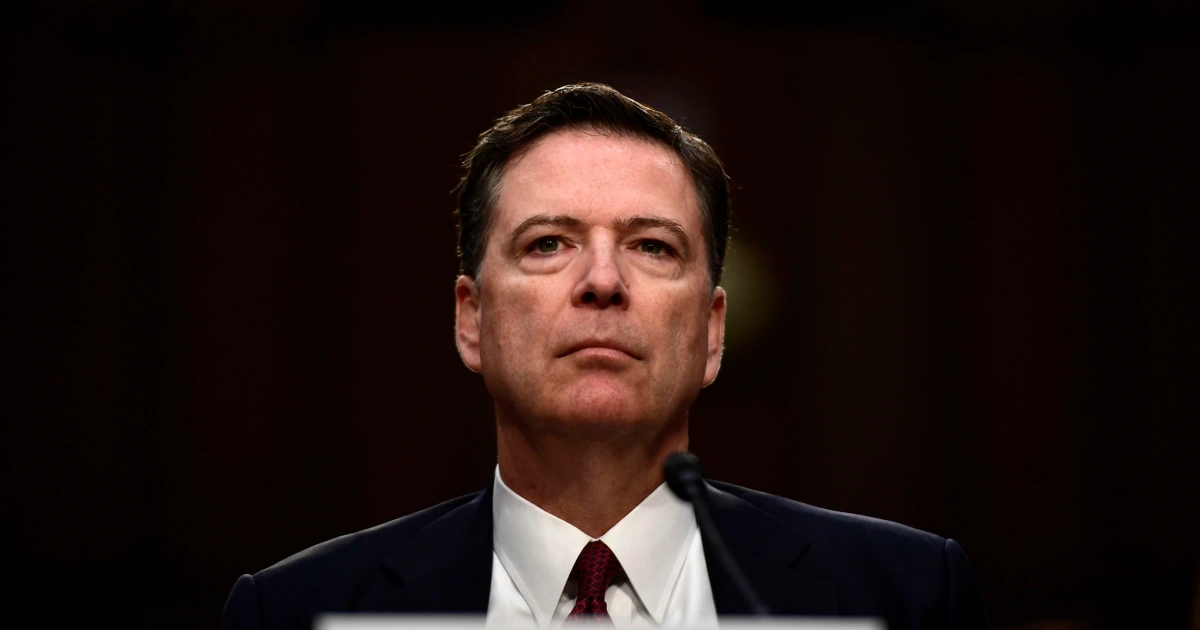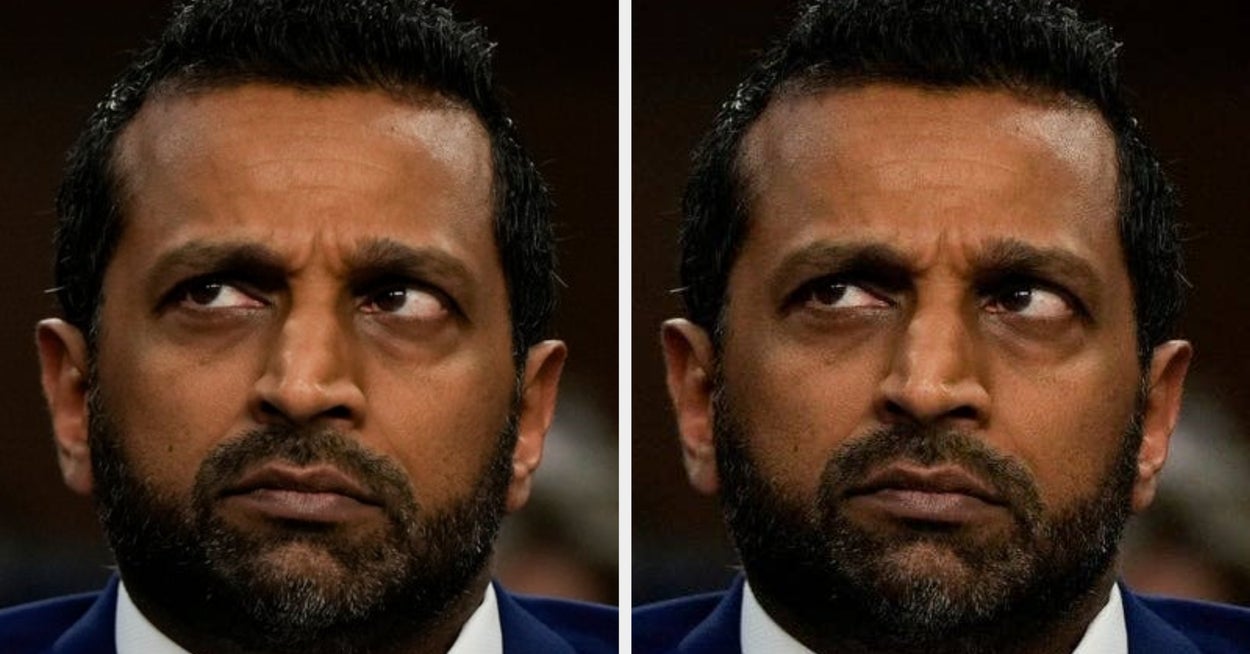
Welcome to the online version of From the Politics Desk, a newsletter that brings you the NBC News Politics team’s latest reporting and analysis from the White House, Capitol Hill and the campaign trail.
In today’s edition, we report on how the indictment of James Comey came to be. Plus, Kristen Welker examines how this government shutdown fight is different from the last, as well as the potential political consequences.
Sign up to receive this newsletter in your inbox every weekday here.
— Adam Wollner
How the Comey indictment happened — and what comes next
Newly appointed acting U.S. Attorney Lindsey Halligan presented the case to secure the indictment of former FBI Director James Comey on her own, according to a source familiar with the grand jury proceedings in Alexandria, Virginia, Vaughn Hillyard, Chloe Atkins and Dareh Gregorian report.
Tapped for the acting role just three days earlier, Halligan’s action came after a senior Justice Department official told NBC News that career prosecutors in Halligan’s office sent her a memo documenting why they believed probable cause did not exist to secure an indictment against Comey.
The appointment of Halligan, who was on President Donald Trump’s defense team in the Mar-a-Lago classified documents case prior to his election to a second term, followed the resignation of prior acting U.S. Attorney Erik Siebert last Friday after pressure grew from the White House to prosecute Comey.
Time was of the essence in bringing an indictment: A five-year statute of limitations on the charges against the former FBI director was set to expire early next week.
Halligan was also the only prosecutor to sign the indictment. It is highly unusual for the U.S. attorney to not assign assistant prosecutors to a case for grand jury presentation.
Halligan and the Justice Department did not immediately respond to NBC News’ requests for comment.
What Comey is saying: The indictment charged Comey with making a false statement and obstruction of a congressional proceeding. He has denied any wrongdoing.
“My family and I have known for years that there are costs to standing up to Donald Trump. But we couldn’t imagine ourselves living any other way,” Comey said in a video on Instagram. “We will not live on our knees, and you shouldn’t either.”
“My heart is broken for the Department of Justice, but I have great confidence in the federal judicial system,” Comey said. “And I’m innocent. So let’s have a trial.”
Comey’s arraignment is set for Oct. 9 before U.S. District Judge Michael S. Nachmanoff, an appointee of President Joe Biden.
What Trump is saying: Speaking to reporters today, Trump praised the Comey indictment. “It’s about justice. … It’s not revenge,” he said.
Trump was also asked who “the next person on your list in this retribution” will be now.
“It’s not a list. I think there will be others. I mean, they’re corrupt,” Trump said.
Read more →
A looming government shutdown raises key questions for both parties
By Kristen Welker
With a funding deadline just a few days away, sources on Capitol Hill from both parties broadly agree that the government is heading for a shutdown.
Republicans want a short-term funding bill with no strings attached, while Democrats are pushing for key Obamacare subsidies that are set to expire at the end of the year and looking to roll back Medicaid cuts. President Donald Trump, meanwhile, has refused Democrats’ latest requests to meet.
This moment is a departure from the March funding fight when lawmakers averted a government shutdown, with the Democratic base urging party leaders to stand up more forcefully to Trump.
A group of Senate Democrats relented back in March and voted to keep the government funded and prevent widespread federal layoffs. The Trump administration is threatening more layoffs if the government shuts down next week, but this time it doesn’t appear that Democrats are backing down. They argue that the president will move forward with these firings whether there’s a shutdown or not.
Both parties are facing significant questions as this fight continues: For Republicans, could their strategy backfire? And for Democrats, how will they extract concessions when Trump has signaled that he is also not willing to budge? And for both parties, what are the political consequences if there is a shutdown?
Historically, Republicans have shouldered the blame for shutdowns, according to polling conducted in past government funding fights. But they broadly have not hurt the party in the long term.
The last time a shutdown occurred at this point in an election cycle was back in 2013, when Sen. Ted Cruz, R-Texas, and his fellow Republicans clashed with Democrats over Obamacare funding. A majority of Americans blamed Republicans for the impasse, according to an NBC News/Wall Street Journal poll conducted at the time, while 31% blamed President Barack Obama. The GOP’s overall popularity also hit a low point, while Democrats held an advantage on the congressional ballot. But just over a year later, in the 2014 midterms, Republicans captured their largest House majority in decades and took control of the Senate.
We’ll delve into the latest on the government funding fight on “Meet the Press” this Sunday with Senate Majority Leader John Thune, R-S.D., and Senate Minority Leader Chuck Schumer, D-N.Y. Former Gov. Andrew Cuomo, who is running for New York City mayor as an independent, will also be joining us with just a few weeks to go until Election Day.
✉️ Mailbag: Has Trump ended 7 wars in 7 months?
Thanks to everyone who emailed us! Here’s this week’s reader question:
“What are the 7 wars that Trump keeps saying he’s ended in the last 7 months? The only wars the press talks about are Israel with Hamas and Russia with Ukraine. I have not heard of any others.”
President Donald Trump has made some version of this claim several times throughout his second term, most recently during a speech to the United Nations General Assembly on Tuesday.
“In a period of just seven months, I have ended seven unendable wars,” Trump said. “I ended seven wars, and in all cases, they were raging, with countless thousands of people being killed. This includes Cambodia and Thailand, Kosovo and Serbia, the Congo and Rwanda — a vicious, violent war that was — Pakistan and India, Israel and Iran, Egypt and Ethiopia, and Armenia and Azerbaijan.”
Our White House Unit researcher Megan Shannon helps to provide some key context around Trump’s role in these conflicts.
Cambodia-Thailand: In July, Trump requested a ceasefire between the two nations and Secretary of State Marco Rubio said that State Department officials assisted with peace talks in Malaysia. A ceasefire was then reached, though the border dispute between Cambodia and Thailand remains unresolved.
Kosovo-Serbia: Trump often refers to the yearslong conflict between Serbia and Kosovo that he helped solve during his first term. In 2020, the president hosted a two-day summit in Washington with top officials from both countries that resulted in the normalization of economic ties between the two nations.
Rwanda-Democratic Republic of the Congo: Trump hosted leaders of the two countries at the White House in June to sign a U.S.-brokered peace treaty. The treaty is an attempt to establish peace between the African neighbors, which have a long history of violent conflict, but questions loom over how it will be implemented.
Pakistan-India: In May, the Trump administration claimed to have brokered a ceasefire between the South Asian neighbors after military conflict broke out over four days. The following month, Pakistan nominated Trump for the Nobel Peace Prize, but India denies that the U.S. served as a mediator.
Israel-Iran: After participating in joint strikes with Israel on Iran’s nuclear facilities in June, the U.S. brokered a fragile ceasefire between the two countries.
Egypt-Ethiopia: Trump has claimed credit for averting a conflict between the two countries over a hydroelectric dam Ethiopia constructed along the Nile River. But the dispute has not been resolved.
Armenia-Azerbaijan: Trump hosted the leaders of the two countries at the White House in August to sign a joint peace agreement, but it still needs to be finalized.
Have a question of your own? Send it to politicsnewsletter@nbcuni.com and we may answer it in a future edition of the newsletter.
That’s all From the Politics Desk for now. Today’s newsletter was compiled by Adam Wollner and Owen Auston-Babcock.
If you have feedback — likes or dislikes — email us at politicsnewsletter@nbcuni.com



